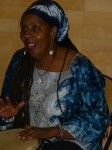What Assata Means to Me
By Amira Davis
The assassination of Martin Luther King, Jr., was, for me, a politicizing moment. It was then I realized, you could die for being Black. I was 11 years old at the time. I became increasingly militant through my junior high school years so that by the time I entered high school and took a Black History class, a profile picture I had drawn of Angela Davis was the symbol to which I would awake, a focal point for my evolving ontological, axiological, methodological, and epistemological approach. By 16, I was reading from the Black Panther Party for Self-Defense’s political education reading list: Che Guevara, Karl Marx, Bobby Seale, among others, along with arts poets of the Black Arts Movement Sonia Sanchez, Mari Evans, Don L. Lee, LeRoi Jones, and Erica Huggins. I had a teenage crush on George Jackson, who made love to me with his words. I had heard of Assata and other political prisoners, but until recently, her experiences and philosophy didn’t stand out. In college, I became involved in Kwame Toure’s All-African People’s Revolutionary Party and began what has become my life work as an artist and critical pedagogue. It wasn’t until I taught a class on Black social movements and used Assata’s autobiography that I became familiar with her radical thought.
In reading her life, her charges against the dominant culture, and her poetic ruminations, I felt I had come full circle, attempting to radicalize students as I had been radicalized, in a semi-rural, central Illinois predominantly white research instititution (PWRI). Inasmuch as her critique of power and structures and the pedagogy of her being as a heuristic for liberatory praxis was still relevant in the ongoing struggle, the co-optation of my students’ young minds with reality TV, gadgets, and consumerism was evident. I attempted again recently with a classroom of students from more middle-class backgrounds at a Research One institution when her bounty was increased. Yet, despite a semester of engagement with the trajectory of Black life in America and daily reminders of the need for active engagement to challenge neoliberalism, the loss of liberties, re-enslavement through incarceration and debt, the collapse of social networks through the funding of perpetual wars, and the destruction of the planet, only a few of over 40 students understood. It is for those few that I continue to follow in the path of sister-women-mother-warriors like Assata for the benefit of those who most surely will come after us when, in our turn, we will become the shoulders upon which young feet will rest.
____________________________________
 Dr. Amira Davis is an artist and educator in Illinois.
Dr. Amira Davis is an artist and educator in Illinois.

0 comments